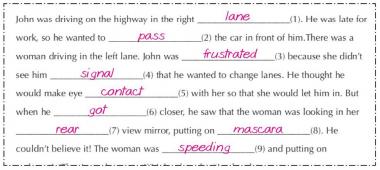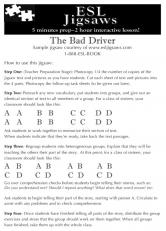ESL Jigsaws
5 Minutes Prep - 2 Hour Interactive Lesson!
Why a Jigsaw?
1. Each student has an essential role in the group.
2. Peer teaching lowers the affective filter.
3. Jigsaws are a four-skills approach, integrating listening, speaking, reading and writing into each lesson. Each student is required to speak. Stories improve listening skills. Group questions practice writing skills.
4. Jigsaws are task-based, cooperative learning.

5. Both individual and group accountability are built in.
6. Memorization trains the ear in the syntax patterns of English.
7. Cloze exercises reinforce vocabulary, idioms and syntax patterns.

8. Stimulating discussions bridge the gap between advanced-level cognitive skills and elementary-level linguistic skills.
9. Clear illustrations in these jigsaw books make stories accessible to lower students.

And:
If you use jigsaw tasks on a regular basis, your classroom dynamic will change! As students do more group work where everyone is involved, barriers between language groups and strangers are broken down. Class spirit improves as more students feel like friends. Try it and see for yourself the difference it makes in your class.

Check out some of the testimonials from other teachers to see what other professionals think about using these books: Click here.


